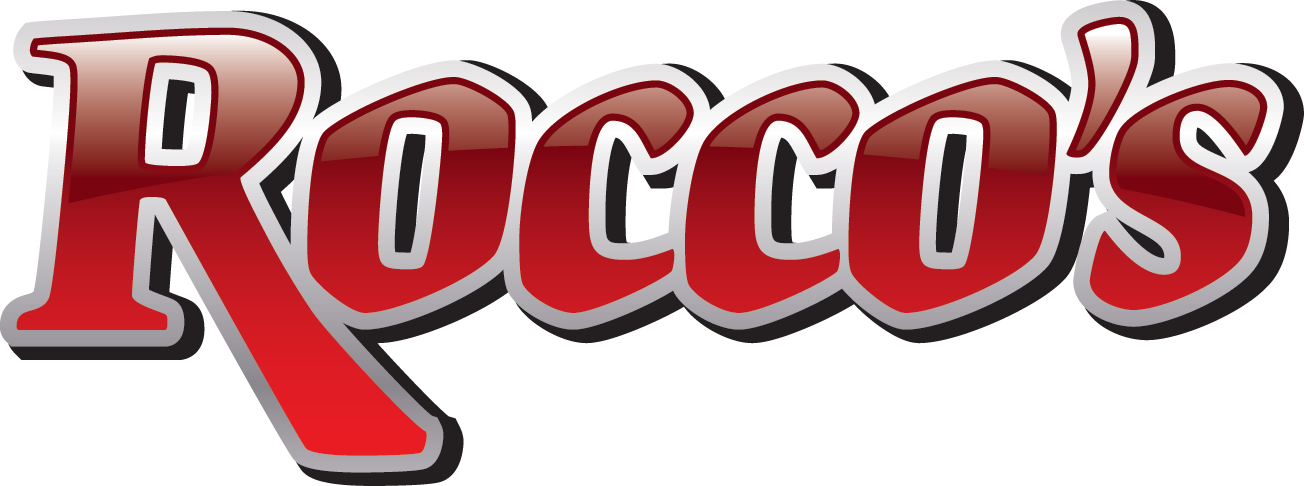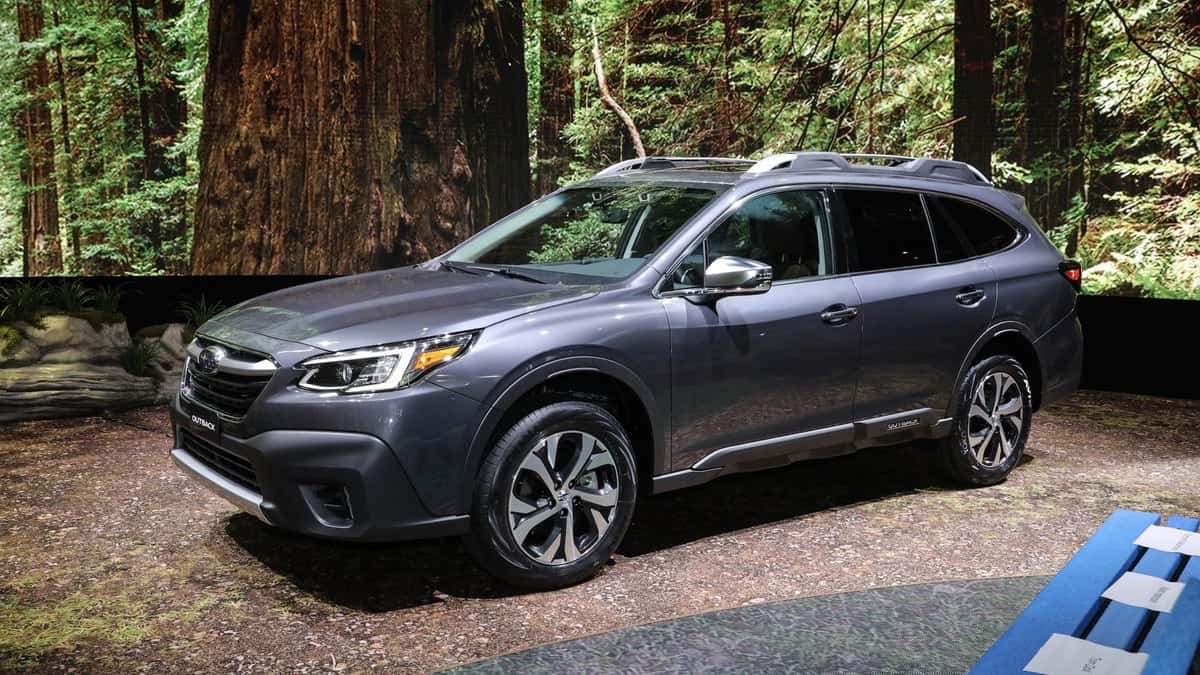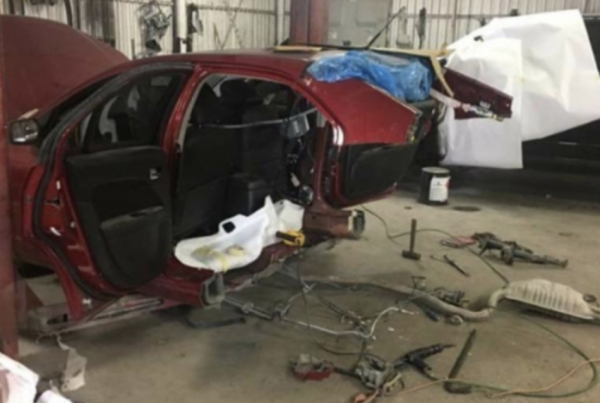Anything that we post online will always focus on two important points: The importance of safe repair and the fact that not every auto body shop performs safe repairs. The reason why we at Rocco’s Collision do that is we feel these are perhaps aspects of auto body repair you may not be familiar with. Therefore, we make the effort to educate you, our customers, and let you know that every auto body shop is not created equally.
When it comes to automobile manufacturing, and in auto body repair, we use the same type of welder. It is called a squeeze type resistance welder. With this type of welder, we are able to replicate the factory spot welds exactly, but only when the welder is properly maintained and the tips are kept clean.
The welder can still be used with dirty tips, but the welds are not guaranteed to be as strong as they would be if the tips were clean. In a high volume or high production body shop, these welders get used all day long every day. So you can imagine many shops may neglect to stop and perform maintenance on these welders, especially when under the gun to perform repairs as fast as possible.
How important is a clean weld? Well, just recently Subaru detected that it had a problem with one of its squeeze type resistance welders, and the welders were allowed to continue making bodies for a little over a week affecting nearly 2,000 cars.
Rather than re-weld your vehicle at a dealership, Subaru is offering to buy back the car regardless of condition or mileage. It is almost unprecedented for a manufacturer to buy back a whole car rather than fix it, so that tells you just how important a proper structural weld is.
As a potential customer of Rocco’s Collision Center, we want you to know that we are aware of the importance of an OEM structural weld, and we follow the manufacturer’s repair standards to a T, and that includes proper cleaning of the squeeze type resistance welders prior to welding your vehicle.
The Recall
As mentioned above, Subaru issued a recall affecting over 2,000 vehicles due to a faulty factory weld. This could cause the vehicles to not hold up as designed in the event of a crash since the overall structure is not as safe or strong as it should be. Once something affects the overall structure of a vehicle, then it’s only a matter of time before the vehicle has something happen to it that can be truly dangerous if not properly attended to. Anything that has to do with welds on a car is extremely critical, which is why we felt you need to know this information.
What you’ll usually see happen following a recall is the dealer would repair the issue as the nearest dealership for free. However, because these poor welds were made by the robotic welder that wasn’t properly cleaned, this problem can’t easily be repaired at the dealership. What’s the solution, you ask? Well, in this case, Subaru is actually offering to replace a vehicle instead of a repair it. This almost never happens, especially since this is not a common problem and because typical problems associated with recalls can easily be solved at the dealership.
According to Consumer Reports, “owners will have the option of exchanging their vehicle for a new one, having Subaru buy it back, or taking back their vehicle after it has been repaired at the factory.”
This weld problem, along with other Subaru related incidents from 2018, has stressed the importance of proper repairs. Specifically, welding-related repairs. Subaru states that the spot-welder tip is cleaned and re-shaped by a dresser (grinding machine) during the manufacturing process. What could have caused the affected parts is the dresser might have been blocked by excess metal chips/powder, “…thus reducing the effectiveness of the welder.” (Subaru) Because this happened, the factory weld tips weren’t as clean as they should be.
How Common Is It?
It’s actually pretty common to see improperly prepared or selected welder tips as the reason why there are faulty squeeze-type resistance spot welds (such as the ones in the Subaru recall). What also happens more often than you’d think is how often body shops are using welders without it being properly maintained or even cleaned, for that matter. You would think with it being considered the “most abused” piece of equipment in a body shop that it would be treated with more care.
What’s interesting here is this is not an uncommon issue with welds. In fact, back in 2017, a panel of collision repair experts spoke about the importance of properly prepared welds in a Society of Collision Repair Specialists (SCRS) video. Despite welders being used on a daily basis, panelist and former SCRS chairman Barry Dorn talked about how body shop managers don’t regularly check on the condition of the tips. Nor do they know how frequently they should be replaced. Welding courses held by I-CAR had extremely low participation from technicians. Without proper training on not just the repair, but the tools used for the repair, more problems like the recent Subaru recall are bound to happen in auto body shops across the USA.
What Happens Next?
Despite its namesake of “grinding machine” as stated in the NHTSA recall, SCRS panelist Toby Chess stated that typical grinders aren’t enough to prepare tips. Simply checking to see if the tips are clean and there’s no build-up of excess metal chips or powder in the dresser also doesn’t suffice. An auto body shop will need to do more. Technicians are advised to use a fresh tip during any major repair and treat tips like they are any other consumable part in auto body repair. This keeps it clean and ensures the best quality repair every single time.
Unfortunately, this doesn’t happen as often as one would think. Many times, technicians will cut corners to perform faster repairs to meet insurance deadlines. It can also be because they’re not educated on the latest OEM repair procedures. These procedures are laid out by your car’s manufacturer to ensure your vehicle is being repaired exactly as the factory instructs. If some spot welds are missed by a body technician, the overall strength of the vehicle can be reduced. If this happens, your risk of injury in an accident significantly increases. This is why OEM procedures are laid out for technicians to follow so this doesn’t happen.
How Can You Be Sure Your Palmdale Auto Body Shop Performed A Proper Weld On Your Vehicle?
We at Rocco’s Collison Centers know that you have many choices when it comes to choosing where to get your car repaired, especially in the Philadelphia and Southern New Jersey areas. We are always looking at any possible recalls for every car manufacturer so that we are better prepared to adequately serve you with the best possible service out there.
Each one of our technicians has gone through extensive training and have received their certifications through I-CAR, PPG, and 3M. We follow OEM repair procedures and even work with insurance companies to ensure your vehicle is in the best hands with us.
We aim to show you why we are the best out there, which is why we are dedicated to giving you the best repair possible for your car!
We have 6 different locations across Philadelphia and Southern New Jersey. We invite you to see for yourself why Rocco’s is the best out there! Feel free to give us a call at anytime at (888)-9-ROCCOS. Or to schedule an appointment or to call any of our locations directly, click here.
We look forward to hearing from you!




